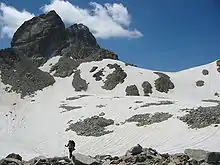
Pyreneism is the practice of mountaineering in the Pyrenees mountains, located on the border between France and Spain. The term was created by historian and geographer Henri Beraldi, as written in the 1898 foreword of volume one of his Excursion biblio-pyrénéenne ("Biblio-pyrenean excursion"), 100 years in the Pyrenees:
The picturesque knowledge of the Pyrenees - not to be confused with the scientific knowledge - is today complete. This required centuries of efforts, traced through a series of writings forming the Pyrenees' history - one says pyreneism like one says alpinism [...][1]
When the word "pyreneism" was launched by Henri Beraldi, it was not intended to stand opposite to the word "alpinism".
In dictionaries
The word first appeared in French dictionaries in the last quarter of the 19th century, always with a joint reference to alpinism considered as a sport and pyreneism as only one of its variants.
- The 10-volume "Grand dictionnaire encyclopédique" from Larousse (1984) has this entry: Pyreneisme 'n' Alp. Practice of mountaineering in the Pyrenees.
- The Grand Robert de la Langue Française (2001): Pyreneism: 1898 - Beraldi - sport, rare. Alpinism practised in the Pyrenees.
The specialists may talk of pyreneism, himalaism, andenism, it refers to the same action of climbing mountains by their faces, by their ridges or by combining both. Paul Bessière. Alpinism, page 50.
Definition and quote that refer to "Alpinism": 1876, from "alpine", and "-ism". The sport of climbing mountains. This sport is practised in the Alps - andinism, dolomitism, hymalayism, pyreneism; ascension, scaling, climbing, mountain, rock climbing...
It is a stupid sport that consists in climbing rocks with hands, feet and teeth [...] Lionel Terray. The conquerors of the useless, page 13.
- The online "Trésor de la Langue Française" gives the following definition as a note in its article on Pyrenean: Pyreneism, subst. masc. Relishing climbs and ascensions in the Pyrenean massifs.
- In the 4-volume Robert's Dictionnaire culturel en langue française (2005), the word "pyreneism" is absent but nevertheless cited in the definition of "alpinism": Sport of mountain climbing (himalayism, pyreneism, [...], page 239.
- Lastly, the dictionnaire des Pyrénées dedicates two entries to pyreneism. The first one relates to "two articles treating the same subject and reaching two radically opposed conclusions". The second entry deals with the evolution of alpinism under the title: "Contemporary pyreneism of difficulty".
Today, the exploration, topographic study, and conquest of mountains have likely reached a historical endpoint. This endeavor has been undertaken by specialists both in France and abroad. In some other countries, different terminology, along with distinct verbs, is employed to describe the activity of climbing a massif, essentially 'making a mountain.' This involves various evolutions and technical improvements that are shared and adopted on a global scale.
If the word 'alpinism,' at least in France, is detailed into 'andinism,' 'himalayism,'... according to the massif in which the sport is practiced, the cultural value of 'pyreneism' in itself remains singular.
Pyreneism, 100 years ago
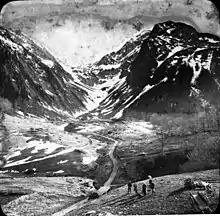
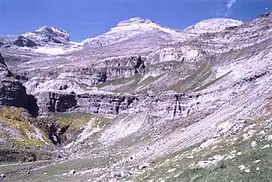
When Henri Beraldi received The Pyrenees Prize from the Society of Geographers in Paris, he gave of "pyreneist" (someone who practices pyreneism) the following definition:
The pyreneist's ideal is to know how to climb, write and feel, all wrapped-up in one. If he writes without climbing, he can do nothing. If he climbs without writing, he leaves nothing. If, climbing, he drily relates it, he leaves but a mere document, that can indeed be of high interest. If - a rare thing - he climbs, writes and feels, if in one word he is the painter of a special nature, painter of the mountain, he leaves a truly admirable book.
In One hundred years in the Pyrenees, one of Henri Beraldi's first studies dedicated to Ramond de Carbonnières at the end of the 18th century, the inventor of Monte Perdido, in which he describes an idea of a pyreneism that possesses an autonomous literary reference:
Pyrenees have existed for only one hundred years. They are "modern". Pyrenees have been invented by Ramond.
This approach is likely a precursor of the socio-anthropological viewpoint as is found in some recent works about mountains.[2]
... the high mountain does not exist spontaneously. Its "entering" within society does not directly depend on its physical attributes, but on its being inscribed in some values system.[3]
Writing founded the pyreneism
Henri Beraldi insists:
- Pyreneism exists only:
within its three periods: the old history, beginning with Ramond (before Ramond it is not history, it is the prehistoric period); the middle age, with Chausenque; the modern era, with count Russell.
- Pyreneism is geographical.
Henri Beraldi, in his Biblio-pyrenean excursion, places Pyrenean writings in the following manner:
Writings of all sorts, book chains ordered similarly to the Pyrenees themselves. And what do the Pyrenees include? - first order summits, -others of second order, - valleys, -thermal establishments.
- Pyreneism, who is concerned?

Henri Beraldi at last asks the following question: "Who visits them (the Pyrenees)?"
and answers:
People of summits, for whom there are no Pyrenees under 3,000 metres altitude; people of half-summits, looking less for difficulty than for picturesque mountains and the beauty of vantage points; people who appreciate the mountain only from the valleys; lastly, people for whom the Pyrenees mean exclusively casinos or taking the waters.[4]
Literature
In order to be acknowledged as a pyreneist, one must therefore, according to Beraldi, climb, write and feel - and necessarily publish. The subject of Beraldi's analysis in One hundred years of Pyrenees is the mass of works of all sorts that deal with travelling to the Pyrenees. The variety of visitors brings variety in works:
From there the diverse Pyrenean literatures: books on summits, books on half-summits, books on valleys, books on thermal establishments.
A trait among the crowd of writers cited and commented upon by Beraldi, is the geographical origin: none (or so few) Pyreneans (born in or by the mountain). The pyreneist authors are tourists who came to the Pyrenees for leisure, even if some settled down or tried to settle down there: Ramon, professor in Tarbes, Russell renting La Vignemale for 99 years, Schrader settling in Pau...
In 1908, Louis Le Bondidier says:
In order to become a perfect pyreneist, it is almost compulsory to not have been born a Pyrenean. The local Pyrenean is immune to the pyreneist germ.
Bedraldi thus distinguishes among these tourist travellers and writers and those who are worthy of being acknowledged as pyreneists.
Issue of the first ascent

The issue as to who was the first to reach the summit of the Pyreneese mountain chain is disputed.
The nature of the Pyrenees, a mid-altitude massif practically devoid of icy zones, makes most summits accessible, at least in summer. Their first ascent likely occurred in neolithic times, when they were occupied by herds and their shepherds, by Pyrenean chamois hunters and by smugglers; these mountains were roamed upon at all times. The places of highest altitude would occasionally be used as hunting posts. Some conquests have been accomplished by tourists, travellers and other pyreneists (the Balaïtous, the high crests of the Vignemale, likely the Maladetta beyond the glaciers...). But the pyreneists themselves sometimes acknowledge it: there already was a sign, a turret, a trace on that summit that one had just conquered. And Ramond de Carbonnières' guides were led to the summit of the Monte Perdido by a Spanish shepherd...[5]
The first ascent is sometimes claimed by the one who calls himself its author: many times Beraldi adds, following the word "first", "by a tourist". The ascent has value, indeed has existence (is publicly known), only when it has been told in writing. Thus it is the writer-tourist who will be acknowledged as its author, and not the mountain locals or the guides who led the ascent.
Names of the summits

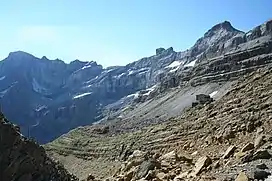
Since the 19th century, a debated topic among pyreneists is the denominations of mountains and summits. A conquest implies naming its object.
Mountain inhabitants, the Pyreneans, have long named the huts, pastures, forests, lakes, passes, sometimes the crests separating two valleys, and other commonly visited places. They ignored the summits as uninteresting places offhand.[3] But each of these places was named within the environment - and the language, Pyrenean Occitan, Aragonese, Catalan, Basque - of the local community whose people walked them and used them. Hence the identical or near-identical toponyms from one valley to the next one, designating different places. Crests, mountains that divide territories, most often carry two or more names: those given by the mountain locals of each slope who were using those.
Tourists, pyreneists, aimed at naming their mountains: one cannot talk but of that which is identifiable. The names of summits were therefore asked to the guides and shepherds, people who did not name these impediments of the land. The summits became "peak of..." (Peak of Campbieil, for example, to designate the peak that overlooked the Campbieil pasture). And some summits got two names, depending on their author (the Pic de Néouvielle or Pic d'Aubert, for example, depending on the valley through which one climbed it). Following long polemics, the pyreneists ended this disorder with toponymics commissions that baptised the summits with official names which were subsequently used by cartographers.
The multiplication of tourists and their appetite for conquest led to an abundance of names: one came to name anything on a crest that would somewhat differ from the rest. Hence, for example, the proliferation of the three-thousanders (summits higher than 3,000 meter above sea level, a symbolic, even mythic height in the Pyrenees). And, finally, attributing to summits the names of pyreneists as a tribute from their peers (Soum of Ramond, Brulle peak, Schrader peak, Pointe Chausenque...), sometimes during their lifetime.
20th century pyreneism
The 20th century, following in Henri Beraldi's wake, keeps developing a pyreneist subjectivity linked with the post-exploration and post-conquest. Although at the end of the 19th century, another type of conquest already begins with the search for new trails, a new form of conquest based notably on an important technical evolution, European at first, then under the influence of North America. Thus is set, similarly to the "difficulty alpinism", a "difficulty pyreneism".
The difficulty Pyreneism

_-_Fonds_Ancely_-_B315556101_A_JACOTTET_2_038.jpg.webp)
Pyreneism, in this meaning, is distinct from alpinism only by the mountain range in which it is practised.
Difficulty pyreneism was not born in the 20th century. Its father is certainly Henri Brulle who, as early as 1878, generalises the use of lifeline and short ice pick during his ascents. With Bazillac, de Monts, d'Astorg, led by guides Célestin Passet and François Bernat-Salles, he achieves many firsts, the north face of Monte Perdido, le corridor of Gaube at the Vignemale, ...
Undeniably the pyreneist enterprise, the adventure, the attraction of the unknown and of the conquest of first order summits, the exploration of new massifs, shrunk as time passed. Likewise, the picturesque having been largely popularised through albums, drawings, paintings, reaching its apex with photography, as for alpinism there needed to conceive a pyreneism with new practices: new routes, north faces, winter pyreneism, solo pyreneism even, which is more akin to conquering one's own self. The creation of the Groupe Pyrénéiste de Haute-Montagne ("High Mountain Pyreneist group") on July 11, 1933, was one of the founding acts of that contemporary "difficulty pyreneism" of which its actors Ollivier, Mailly, Cazalet, Henri barrio, Arlaud and many others used the most modern progression techniques of the time, developed by the Eastern Alpine climbers (use of progression pitons). The post-war period also saw a new generation of climbers getting to grips with all still-untouched faces, all winter runs (the French Jean and Pierre Ravier, Patrice de Bellefon, Despiau, Sarthou..., the Spanish Rabada, Anglada, Montaner, Navarro... and all those who prowled all folds of the range one after the other).
At last, all crests and faces vanquished, the ephemeral ice cascades became the challenge at the end of the 20th century. Practices also evolve: retakes of old routes in free climbing or free solo climbing, including on winter routes.
This "difficulty pyreneism" has also engendered many writers who illustrate the pyreneist passion.
Looking for pyreneism
The idea by which there exists a pyreneist specificity has always been subjected to debate.
In the line of Beraldi one may find typically pyreneist arguments:
- For J.C. Tournou-Bergonzat:
The source that originally brought pyreneism to existence justified itself in a scientific exploration where usefulness superseded feelings. But at time passed, as the knowledge on Pyrenees increased, the human overwhelmed by the soul it lends to these mountains will progressively, with an all-Lamartinian sense of poetry, animate the last stage of the land and transform it into an ecumene. In this, he created his Pyrenees. He measures its summits, then in turn the summits exalt beauty in Man, rapture, contemplation (see "One hundred years of mountain painting").

Lastly the pyreneist claims for himself to be an alpinist such as Henri Beralsi, Ramond, la Pléiade[6] prepared us to be, but also the shepherds who became guides and authentic mountain amateurs. The historian-geographer and other pyreneists gave us a fervour, the taste for faithfulness to a mountain, a passion characteristic of the alpinistic practice, often with elegance. But after two centuries of exploration, conquest, invention, desire that everyone carries within, pyreneism has reached a natural as well as cultural apex of references that make the Pyrenees into a word: pyreneism, with its pyreneist literature, pyreneist iconography, in the natural high-ground of an occidental landscape civilisation. And from that, pyreneism and its diversity of actors can pretend to the universal.
But the question, laid by the editor of the "Dictionnaire des Pyrénées", brought about two opposite answers.
- For Hélène Saule-Sorbé, "to go make a mountain is also to travel across its history", thus meeting with Jean and Pierre Ravier who use the expression "enter into pyreneism" or Joseph Ribas for whom "the pyreneist integrates the living and the cultural in the landscape, to his eyes a meeting place, a place of exchange".
- For Renaud de Bellefon, pyreneism is "a dumping ground devoid of meaning, because its sensitive and scientific approaches, sometimes opposed to the sport reference, come from all over" and "its invention is primarily efficient in the field of bibliophily (it creates a space for a collection)".
Famous pyreneists
- Louis-François Ramond de Carbonnières, born in Strasbourg (1755–1827), father of pyreneism (the Ramond family came from Castres).
- Vincent de Chausenque - April 9, 1781, in Gontaud (Lot-et-Garonne) – April 24, 1868, in Gontaud (Lot-et-Garonne).
- Charles-Marie-Étienne Champion Dubois de Nansouty (1815–1895).
- Paul Edouard Wallon, born in Montauban (Tarn-et-Garonne) (1821–1895).
- Eugène Trutat (1840–1910).
- Franz Schrader, born in Bordeaux (1844–1924).
- Félix Régnault (1847–1908).
- Maurice Gourdon, born in Nantes (1847–1947). Biography in S.P.M. Bulletin, Paris. Note to add:[7]
- Henri Brulle (1854–1936). He is considered as the founder of "difficulty pyreneism".
- Henry Russell, 1834 in Toulouse (Haute-Garonne) – 1909 in Biarritz (Basses-Pyrénées). He is one of the pioneers in the conquest of the Pyrenees.
- Henri Beraldi, February 6, 1849, in Paris (8th arrondissement) – March 31, 1931, in Paris. He is a famous French pyreneist.
- Pierre-gaston Sacaze, autodidact botanist shepherd. We owe him a monumental Pyrenean herb book.
- Henri Lefebvre, June 16, 1901, in Hagetmau (Landes departement) – in 1991 in Navarrenx (Pyrénées-Atlantiques). He is a geographer and sociologist who wrote several books on the Pyrenees.
- Jean Fourcassié, born in Albi on October 17, 1886, died in Calella de Palafrugell, Costa Brava, Spain, on July 15, 1955.
- René d'Astorg, (1860–1940)
- Georges Ledormeur (1867–1952), author of the Ledormeur guide: "Les Pyrénées Centrales - du Val d'Aran à la Vallée d'Aspe" (Central Pyrenees - from val d'Aran to the Asp valley").
- The Cadiers brothers: George, Henri, Albert, Edouard and Charles
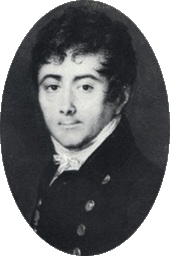
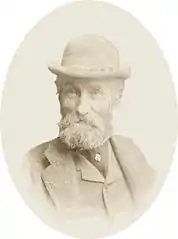 Charles Packe, end of 19th century pyreneist
Charles Packe, end of 19th century pyreneist Nansouty
Nansouty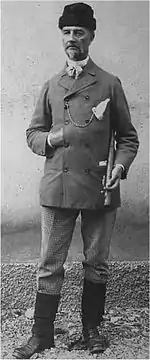
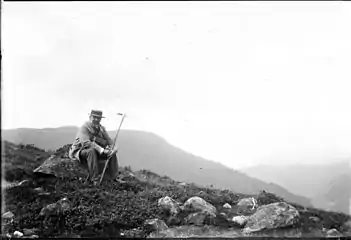 Eugène Trutat in 1897
Eugène Trutat in 1897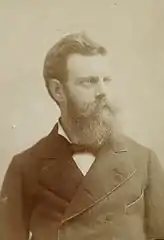
See also
References
- ↑ Henri Beraldi. Cent ans aux Pyrénées, 7 volumes edited from 1898 to 1904, reprint by Les amis du Livre Pyrénéen, Pau, 1977.
- ↑ (in French) Barthélémy Py. Le film de montagne dans les cinématographies occidentales. Doctorate thesis, Art et histoire de l'art. Université Paul Valéry - Montpellier III, 2014.
- 1 2 (in French) Viviane Seigneur. Socio-anthropologie de la haute montagne, page 24. Paris, L'Harmattan, 2006, 312 p.
- ↑ H. Beraldi's word here for "taking the waters" is "grande douche", literally "large shower". This refers to the showers in the then numerous thermal establishments in the Pyrenees, renown for the quality of their waters - so much so that at the height of water taking fashion (predominantly 19th century) these mountains were cited where the Alps were not even mentioned. See for example Fontan, Jean-Pierre-Amédée (1855). Recherches sur les eaux minérales des Pyrénées, de l'Allemagne, de la Suisse et de la Belgique [Research on mineral waters from the Pyrenees, Germany, Switzerland and Belgium] (in French) – via Google Books.
- ↑ Louis Ramond de Carbonnières, report of his ascent of Monte Perdido in Journal des Mines, Thermidor year XI (July–August 1803).
- ↑ La Pléiade is the name given by Henri Beraldi to the group of seven pyreneists who achieved the conquest of the pyrenean summits from 1860 to 1902 : Russell, Lequeutre, Wallon, Schrader, Gourdon, Saint-Saud, Prudent; to whom he added Émile Belloc. Cf. Cent ans aux Pyrénées, tome III.
- ↑ S.M.P.: Société des peintres de montagne ("Mountain Painters Society"), created by Jean François Daniel (a.k.a. Franz) Schrader in 1898 in Paris.
External links
- See the well-documented article (in French) by Renaud de Bellefon, L’écueil des revues pyrénéistes: la tentation de l’érudition rétrospective ("The pitfall of pyreneist periodicals: the temptation of retrospective erudition") in Revue de Civilisation Contemporaine ("Contemporary Civilisation magazine") of the Université de Bretagne Occidentale Europes/Amériques ("University of Occidental Brittany Europes/Americas").
- (in French) History and chronology of the first ascents in the Pyrenees
- (in French) Portraits of pyreneists
- (in French) An approach of Pyreneism
- (in French) Photos des Pyrénées en noir et blanc" ("Black and white photos of the Pyrenees") (1945-1965) - ArtPyr ed.
- (in French) History of pyreneism and biographies of great pyreneists
- (in French) Les Amis du Livre Pyrénéen ("Friends of the Pyrenean Book") (pyreneism bibliography and history)
- (in French) Site of the Pin à Crochets editions (pyreneist bibliography) (pin à crochets is Pinus uncinata)